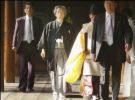Posted on : May.18,2006 10:04 KST
Modified on : Sep.19,2006 19:43 KST
 |
|
Japanese Prime Minister Junichiro Koizumi‘s visit to Yasukuni Shrine caused uproars in China and Soutk Korea
|
Civic organizations of South Korea, Japan and Taiwan will form an international solidarity group to protest the visit of Japanese political leaders, including Prime Minister Junichiro Koizumi, to the Yasukuni Shrine in Japan, whose honorees include convicted Class 1 war criminals. Reverend Lee Hae-hak, head of the South Korean preparatory committee of the new organization, said, “Civic groups of these three countries agreed that the Yasukuni Shrine honoring Class 1 war criminals as gods is an ideological foundation of Japan’s tilting toward ultra-nationalism, and they decided to act jointly to stop Koizumi’s visits to the controversial shrine, as well as to make the Japanese government retract the enshrining in it of about 49,000 forced recruits from South Korea and Taiwan.”
The international solidarity group will be organized under the name, "Joint Action Opposed to Yasukuni." The Institute for Research in Collaborationist Activities will act as the South Korean committee, and descendants of indigenous Taiwanese who waged a liberation movement during Japanese colonial rule in Taiwan will assume the role in that country. In the meantime, an organization named "Candlelight of Peace, Candlelight Action against Dark Yasukuni" will represent the Japanese end of the committee. The Korean committee will hold an inaugural rally at Seoul’s Namsan on May 23 and the Japanese and Taiwanese committees will have similar rallies in Tokyo and Taipei on the same day.
Kim Eun-sik, director of the Korean Council for Redress and Reparations for the Victims of WWII Atrocities, who is taking charge of preparatory affairs for the South Korean committee, said, “It is very dangerous for Japan to be heading toward ‘normal country’ status, in which it can wage war, without renouncing its disgraceful past history or without heartfelt apology. The Yasukuni Shrine is at the center of the problem.” He added, “We will stop such a movement through international solidarity.”
The action group will participate in the first phase of a trial against the Yasukuni shrine (what is the shrine charged with?--Ed.) to be held at Tokyo District Court on May 25. Representing the plaintiff, (who is the plaintiff?--Ed.) Rev. Lee pointed out, “In this lawsuit against the Japanese government, it is highly possible that the court will rule that [the shrine issue] is not a problem which the court can judge against or the government can interfere in. If that happens, we are going to file another suit against the Yasukuni Shrine in August.”
Joint Action Opposed to Yasukuni will also hold an international academic symposium July in Seoul with participation of South Korea, Japan, Taiwan, the U.S., Australia, and Germany. It also has a plan to organize a massive candlelight vigil in Tokyo on August 13-16 to make Japanese citizens aware of the problems surrounding the Yasukuni Shrine. The South Korean committee is discussing with the Japan-based Korean civic groups Mindan and Chongryon in Japan, as well as academic, religious and artistic communities in Korea, with a goal to gather over 1,000 South Korean participants for this event. The committee plans to bring the Yasukuni issue before the U.N. Human Rights Council to inform the international community.
The movement to organize an international solidarity group dates back to September 30 last year. At that time, the Osaka High Court ruled that Prime Minister Koizumi’s visit to Yasukuni “violates Article 20 of the Japanese constitution, which bans religious activities by government agencies.” The ruling stated, “As the act is by a prime minister, it is an official activity, but at the same time it has serious religious meaning.” But, despite this ruling, Koizumi made his fifth visit to Yasukuni in October last year, prompting the civic organizations in the three nations to decide to jointly cope with the issue.

